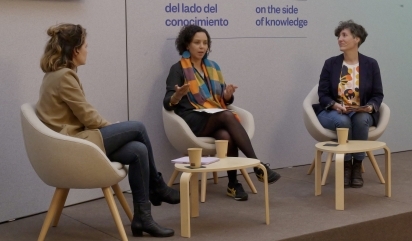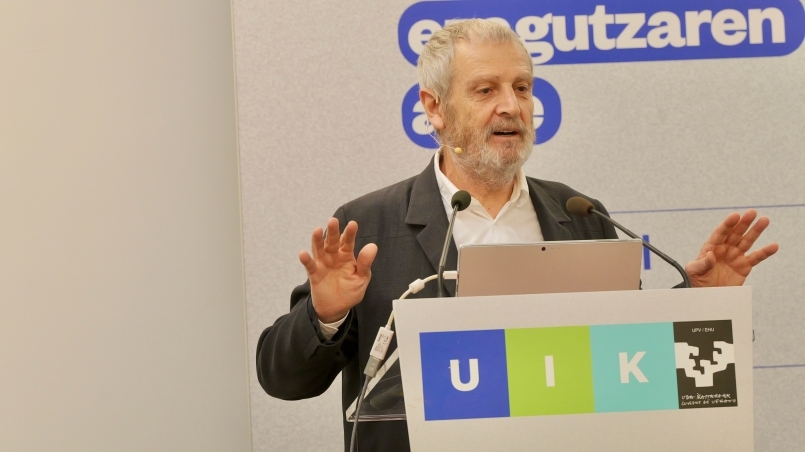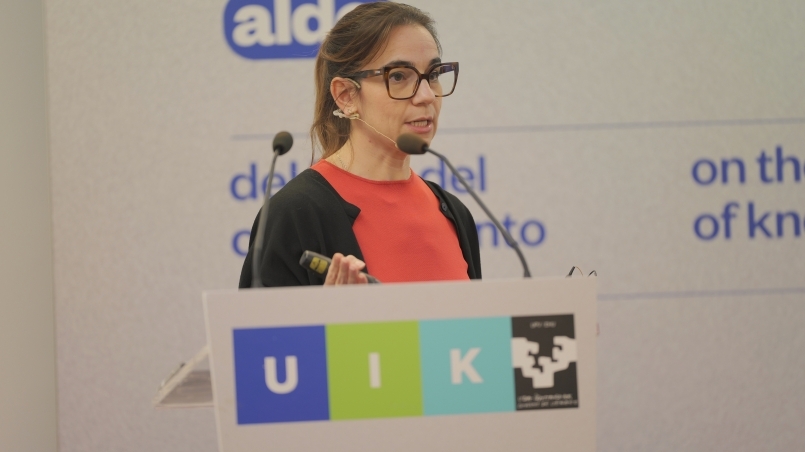Climate emergency: challenges and opportunities for cities in the global north and south
Researchers Marta Olazabal and Marcelle Mardon participated in the public event Cities in a changing climate, organised by the Donostia Sustainability Forum. During the dialogue, the experts shared some of the main challenges that cities face in the context of climate change and increasing urbanisation processes. They also highlighted some of the opportunities offered by decarbonisation and adaptation policies in cities.

Marta Olazabal studies the progress of climate action in cities from an interdisciplinary perspective. Olazabal leads the Adaptation Research Group at the Basque Centre for Climate Change (BC3). She has a background in environmental engineering, a PhD in land economics and almost 20 years of experience in urban sustainability and climate governance.
Marcelle Mardon is an architect and researcher in community-led sustainable urban development at the International Institute for Environment and Development (IIED), a global think tank present in more than 60 countries. For the past 12 years, she has focused on studying informal settlements in cities of the global south, focusing on urban infrastructure, housing, health and livelihood improvement.
Progress on climate policy in cities
Marta Olazabal opened the event, which took place at the Miramar Palace in Donostia-San Sebastián, with some important data: half of the world's population lives in cities, and in Europe, this figure is rising to 80%. Olazabal pointed out that cities currently occupy only 3% of the territory but consume 60% of energy and generate 70% of greenhouse gas emissions. This consumption is not evenly distributed, with most of it taking place in industrialised countries. However, most of the growth in urbanisation processes is taking place in the countries of the global South, mainly in sub-Saharan Africa and South-East Asia, so consumption is also expected to increase in these areas.
Concerning the impacts of climate change, Olazabal said that more than 5 million additional deaths are estimated to occur annually due to adverse temperatures. Although most of these are cold-related and occur in countries in the global south, excess temperatures are one of the main impacts of climate change. "In Spain alone, in 2022, there were more than 11,000 additional fatalities due to the heat waves we experienced in that summer," Olazabal said. Added to this are the effects of urban air pollution, which also caused 25,000 premature deaths in 2022. But in this context, thousands of cities worldwide are preparing to cope with the effects of climate change and reduce their emissions. "Action is concentrated in cities in the global north. In Europe, there are 10,000 cities with 280 million people taking action," the researcher points out. In comparison, Olazabal continued, "in sub-Saharan Africa, only 360 cities are planning to tackle climate change, but they represent 160 million people". Smaller cities, meanwhile, are also starting to act, although they face difficulties in terms of technical capacity and obtaining the necessary funding to implement climate action.
In relation to the progress of climate planning in European cities, Olazabal pointed out that much greater progress has been observed in countries such as France, where it is compulsory for municipalities to have climate change mitigation and adaptation plans. In addition, the researcher considers it essential to address mitigation and adaptation together to take advantage of synergies and highlighted that the areas with the greatest potential are the renovation of public space, promoting public transport and more active mobility, improving infrastructures and introducing green spaces, as well as promoting behavioural changes.
Olazabal concluded her presentation by recalling that cities, however, face a multitude of challenges in addition to climate change, which must also be taken into account and shared some of the strengths and areas for improvement identified in climate planning.
Climate change and urbanisation in the global south: a dangerous combination?
Marcelle Mardon began by explaining that her work focuses on urbanism from the perspective of informality and raised the question of whether urbanisation processes, which in principle are perceived as a solution to many climate problems, can also become a dangerous combination. Mardon was referring to the situation in informal settlements where around 60% of Africa's population lives. "Informal settlements are areas with little infrastructure, where basic things like access to clean water, roads, sanitation or decent housing do not exist”. Mardon stressed that 1 in 8 people in the world live in these conditions, which is a major global challenge.
In relation to climate change, Mardon pointed out that in these areas climate change is already very present. "Every year people have to prepare for floods or heat waves of 50°C in some cities. This is the normality. It is affecting their health and their livelihoods", she said. But she was also keen to point to positive aspects. For example, in the framework of SDG 11, campaigns have been launched to "leave no one behind" which involve people living with this type of vulnerability. The UN's New Urban Agenda addresses the importance of the environment, resilience to climate change and natural disasters, inclusiveness, where Mardon's work is mainly focused, and informal economies.
In this context, Mardon proposes to work on disruptive resilience, and highlights that by 2030 urban areas are expected to be 60% larger worldwide. Also, she reminded the public that all African countries generate only 4% of greenhouse gas emissions, so the question arises as to why they must contribute this challenge. For Mardon, the reason is obvious: these communities are on the front line of climate change impacts. In any case, communities in the global south are already contributing to tackling climate change, and to other environmental problems such as plastic and cardboard recycling. Thus, it is key to talk about urban climate justice, connecting social justice and decarbonisation. Finally, Mardon stressed that it should not be forgotten that many of these cities are also home to communities displaced by climate change impacts. With even fewer rights, these people arrive and settle in informal settlements.


